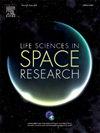Plasma exchange as a neuroprotective strategy for post-spaceflight neuroinflammation in astronauts
IF 2.8
3区 生物学
Q2 ASTRONOMY & ASTROPHYSICS
引用次数: 0
Abstract
Extended space missions, such as upcoming crewed explorations to Mars, pose significant physiological challenges, including neuroinflammation due to microgravity, cosmic radiation, and prolonged confinement. This article explores therapeutic plasma exchange (TPE) as a potential countermeasure to mitigate post-spaceflight neuroinflammation by reducing circulating neurotoxic factors, stabilizing the blood-brain barrier, and replenishing protective plasma proteins. By examining parallels between spaceflight-induced neurological effects and terrestrial neurodegenerative conditions, we propose that TPE could serve as a viable intervention for astronaut health. The implementation of space-compatible apheresis technologies could play a crucial role in sustaining cognitive function and long-term brain health for deep-space travelers.
血浆交换作为宇航员航天后神经炎症的神经保护策略
延长的太空任务,如即将到来的火星载人探索,会带来重大的生理挑战,包括微重力、宇宙辐射和长时间禁闭造成的神经炎症。本文探讨了治疗性血浆交换(TPE)作为一种通过减少循环神经毒性因子、稳定血脑屏障和补充保护性血浆蛋白来减轻航天后神经炎症的潜在对策。通过研究太空飞行引起的神经系统影响与陆地神经退行性疾病之间的相似之处,我们提出TPE可以作为一种可行的宇航员健康干预措施。实施与空间兼容的分离技术可以在维持深空旅行者的认知功能和长期大脑健康方面发挥至关重要的作用。
本文章由计算机程序翻译,如有差异,请以英文原文为准。
求助全文
约1分钟内获得全文
求助全文
来源期刊

Life Sciences in Space Research
Agricultural and Biological Sciences-Agricultural and Biological Sciences (miscellaneous)
CiteScore
5.30
自引率
8.00%
发文量
69
期刊介绍:
Life Sciences in Space Research publishes high quality original research and review articles in areas previously covered by the Life Sciences section of COSPAR''s other society journal Advances in Space Research.
Life Sciences in Space Research features an editorial team of top scientists in the space radiation field and guarantees a fast turnaround time from submission to editorial decision.
 求助内容:
求助内容: 应助结果提醒方式:
应助结果提醒方式:


